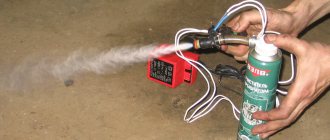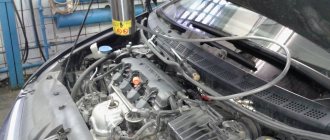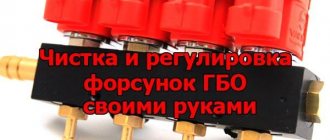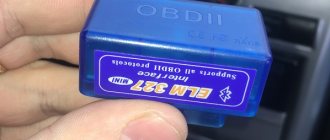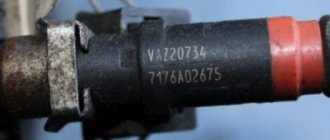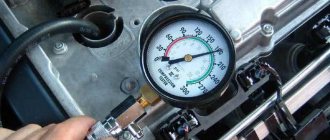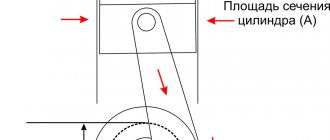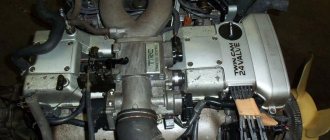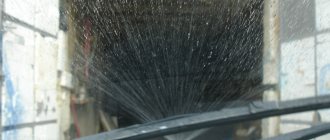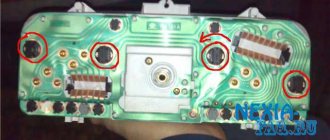Good day! Today I decided to experiment a little, or rather to pamper the techie.
Once upon a time I bought a Hi-Gear Diesel Injector Cleaner
and today I decided to try it. The engine runs really well, but why waste it?))
Issue price: 88 UAH Mileage: 259400 km
see also
Comments 41
Guys, I’ll upset someone, and the opposite. In Ukraine, there is no good diesel fuel, this is a fact, they buy butyazed diesel fuel, those who resell it at a network of gas stations resell it, and whoever the gas stations... some don’t disdain either. I worked for a year and a half with a person who was involved in supplies to large gas stations in Ukraine. I personally filled liquid moths more than once. The engine runs quieter, cleans the injectors and the driving efficiency is better. For prevention, it can and should be poured.
Complete bullshit! It’s also good if the filter takes on the dirt from the tank. There’s a separate thread on how to wash the injectors and fuel injection pump.
Well, that's probably true. wait and see…
Complete bullshit! It’s also good if the filter takes on the dirt from the tank. There’s a separate thread on how to wash the injectors and fuel injection pump.
no difference. Don't waste your money! + The fuel filter needs to be replaced...
The filter needed to be changed
The filter needed to be changed
no difference. Don't waste your money! + The fuel filter needs to be replaced...
We are waiting for the result, but I’ll tell myself that I also recently filled in Castrol TDA (diesel) for a test, so the engine became noticeably smoother + the injection pump is quieter, so we have to use it with our “high-quality” diesel fuel.
I've been driving around in Skoda and topping up with Castrol TBE (Gasoline), well, let's put it this way. a little bit more grip
We are waiting for the result, but I’ll tell myself that I also recently filled in Castrol TDA (diesel) for a test, so the engine became noticeably smoother + the injection pump is quieter, so we have to use it with our “high-quality” diesel fuel.
no difference. Don't waste your money! + The fuel filter needs to be replaced...
Well, can they really believe that this product will clean it? The highest quality cleaning is mechanical, i.e. I took it off and sent it to a stand, where they will wash it, press it, adjust it if necessary. And it’s not safe to just pour any crap into the tank. Although I add HIGH GEAR anti-gel, but only in severe frosts.
experiment!))) for one thing and let’s see if it’s possible to pour all sorts of garbage into the tank or not...)))
This is right! Someone should check this!)) It won’t be a damn thing!)) I only poured something like that into my work car! The Japanese ate it, and I didn’t even have heartburn!))
and I also think that for a leak it will be like butter on bread))
I washed it with Japanese crap. And I didn’t pour it into the tank, but disconnected the supply and return tubes, stuffed them into a jar of potion with a capacity of 1 liter, started it up and rattled the Murzik until it stalled. This was written by the manufacturer on the jar.
no difference. Don't waste your money! + The fuel filter needs to be replaced...
In general, we are waiting for the conclusions!
In general, we are waiting for the conclusions!
no difference. Don't waste your money! + The fuel filter needs to be replaced...
I believe that if everything is normal, it is better not to pour anything, but simply change the filters and oil according to the regulations. The situation can be aggravated if the internal combustion engine is not new.
The longer the engine runs, the more contaminants accumulate inside it. Soot, soot deposits, resins, sludge, decomposition products - all this complicates the normal operation of the system. As a result, the car begins to function worse and loses power. If the process is started, the matter may end in breakdown and repair. Therefore, all systems inside the vehicle need to be cleaned, injectors are no exception. And for this it is not necessary to send the car to a service center. For example, the Hi-Gear diesel injector cleaner, when used regularly, effectively combats various types of deposits.
Flushing diesel injectors - do they clean them themselves?
Repairing common rail injectors with your own hands
In a diesel engine, sometimes only problems that are characteristic of it arise. For example, fuel injectors malfunction and then have to be cleaned. Let's look at when it is necessary to clean the injectors and how to do it.
The cause of this problem can be both the specific design of the diesel unit and low-quality fuel, which is more than enough in Russia. If there are problems associated specifically with the injectors, the diesel engine begins to consume more fuel, function unstably and be reluctant to start. Moreover, black smoke pours out of the exhaust pipe when the injectors are clogged.
Every diesel driver knows that restoring the injectors of a given engine is not a cheap pleasure, so flushing is expensive, as you might guess. Therefore, you will no longer wonder why many car owners strive to wash diesel injectors with their own hands. People save, whatever. But is it right to wash the injectors yourself? Maybe a car service would be the best solution?
In a garage, you definitely cannot perform dry cleaning, much less ultrasonic cleaning. All that remains is to clean the injectors with special cleaning compounds. Fortunately, you will wash the injectors in the same way as you wash injection nozzles. But it’s worth taking a look at the cleaning compounds – at least briefly. Among the washing fluids for diesel injectors, substances from the brands Xado, Liqui Moly, High Gear and Vince are well known. These products cost differently, but believe me, they work the same. At least, there will definitely not be any obvious differences.
Flushes can be added to the tank according to the instructions and driven according to the instructions. According to the second option, the liquid is used specifically for cleaning the injectors, and it is not poured into the tank. Vince earned a good reputation here, but the other substances did not prove to be useless. Injector cleaning products do not pose the slightest danger to the injectors themselves, which is why car enthusiasts willingly use them. It is best to use cleaning compounds by adding them to fuel for preventive purposes, and to clean serious deposits of coke and soot directly.
Cleaning diesel injectors with your own hands has one very positive difference - you can carry out this procedure as efficiently as possible, but a car service does not guarantee this, even an elite one.
Why is it necessary?
Hi-Gear diesel injector cleaner is a modern chemical product that can quickly and efficiently clean diesel engine injector nozzles even from old contaminants. This ensures normal operation of the system and extends the life of the injectors.
In addition, the cleaner has a whole bunch of “side” effects - no less useful than the main effect. So, it is necessary to combat the formation of plugs, to reduce the risk of corrosion and scuffing, to neutralize moisture and some other functions. For example, some Hi-Gear products not only clean injectors, but also have a conditioning effect, neutralize harmful substances, renew the engine and increase its power.
Signs confirming injector contamination
It is almost impossible to determine clogged injectors by eye. However, there are certain signs that allow you to be wary and take urgent diagnostic measures. These include:
- increased consumption of diesel fuel;
- difficulties when starting the engine;
- the exhaust pipe produces a thick plume of black smoke;
- uneven operation of the unit;
- reduction in power or acceleration dynamics;
- increased toxicity of exhaust gases;
- Under load the engine makes strange sounds.
Each individual or several signs at once should alert the car enthusiast, prompting him to contact the service. It is there that an accurate diagnosis of the problem will be established. Delaying the cleaning of diesel engine injectors can lead to serious problems with the functions of the fuel system.
Purpose and compatibility
Hi-Gear injector cleaner is designed to clean and care for diesel engine injector nozzles to increase their service life and performance. Improves atomization and dynamic movement of the fuel mixture. All products in the series are compatible with catalytic converters and turbochargers. Many of them have also successfully passed compatibility and safety tests specifically for Russian cars.
This product is used in diesel passenger cars, minibuses, medium-sized trucks and heavy-duty vehicles.
Why do injectors become dirty?
Active use of a diesel car requires frequent refueling. But the quality of fuel does not always meet the necessary requirements. An artificial increase in the volume of diesel fuel by unscrupulous gas stations affects not only its quality, but also the functionality of its fuel system. During operation, nozzles have to experience considerable loads from the pressure acting on them, as well as high temperatures.
Burning diesel fuel contributes to the formation of soot, which safely settles on the injectors, disrupting their functionality and preventing the supply of fuel. When flushing diesel engine injectors is rarely performed, deformation of individual elements may occur. This significantly reduces the ability to supply fuel, which entails a decrease in engine performance and increased diesel fuel consumption.
Action
An additive for cleaning injectors, as a rule, has a complex effect and performs not only cleaning, but also some other functions. Here is the effect the drug has on the fuel system and its individual components:
- restoration of the shape of the fuel spray torch;
- improvement of fuel combustion dynamics;
- effective cleaning and prevention of carbon deposits in the combustion chamber;
- lubricating effect;
- prevention of wear and scuffing;
- preventing metal corrosion;
- easier engine starting;
- preventing the formation of traffic jams in the system;
- fuel economy;
- reducing the harmfulness of exhaust gases;
- suppression of the growth of harmful bacteria in the tank;
- increasing the power and dynamics of the vehicle;
- reduction of noise and vibration in engine operation;
- reduction of engine smoke;
- increasing the comfort of driving a vehicle.
Diesel engine cleaners
One of the most important performance qualities of diesel fuel is its ability to ensure the cleanliness of fuel equipment and parts of the diesel cylinder-piston group. When fuel burns, carbon deposits form on the walls of the combustion chamber and intake valves, as well as on the nozzles and nozzle needles of the injectors. At the same time, on the piston heads, intake valves and walls of the combustion chamber, the deposit is dense, hard, dark in color, and on the nozzles and injector needles there is a soft, resinous deposit of yellowish or light brown color, like a varnish film. Carbon formation in the engine depends on the content of actual tars and sulfur in diesel fuel, the fractional composition, the content of unsaturated and aromatic hydrocarbons, ash content and coking capacity.
The presence of carbon deposits on the walls of the combustion chamber and the piston bottom (Fig. 27) impairs heat transfer to the engine cooling system and leads to a decrease in the volume of the combustion chamber. The formation of carbon deposits on the intake valves (see Fig. 26) leads to their coking, as a result of which the necessary fit of the valve disc-seat connection is disrupted. As a result, there is a breakthrough of hot gases and burning of the seating surfaces of the valve and seat, and in some cases the valve hangs.
Rice. 27. Carbon deposits on the piston bottom
The largest number of parametric failures in diesel engines is caused by carbon deposits on injectors. Due to carbon deposits on the injector nozzles, the quality of fuel atomization deteriorates and the spray pattern is deformed. Coking of the nozzles and hanging of the nozzle needles leads to fuel leakage, since in this case the needle does not sit on the sealing cone of the nozzle and does not completely block its channel. Due to contamination inside the injector, an insufficient amount of fuel is injected into the combustion chamber (the composition of the fuel-air mixture is disrupted), while it is poorly atomized, which leads to a violation of the uniformity of the fuel-air mixture and, as a result, smoking, a decrease in power and operating efficiency diesel (Fig. 28).
Rice. 28. Spraying fuel with a nozzle: a) in the presence of contamination (several jets); b) cleaned nozzle (mist spray)
The use of well-known technologies for in-place servicing of automotive equipment using auto chemicals makes it possible to quite effectively clean (flush) the fuel system while the engine is running.
The main components of diesel fuel additives are polyisobutylene-based detergents. Special additive packages also include chemical compounds to improve the performance properties of diesel, such as defoamers, demulsifiers, lubricants and cetane-boosting components. In addition, special dyes, markers and fragrances can be added to diesel fuel additives (additive packages) at advanced petrochemical plants.
The use of detergent additives for diesel fuel significantly reduces the amount of deposits in diesel, including on the injection needle, and fuel atomization is carried out in an optimal mode, which significantly improves engine performance.
Among the cleaners, we can distinguish preparations that are simply added to the fuel tank, and preparations that need to be poured directly into the injection system, i.e., without mixing with diesel fuel. Despite the fact that the second method also refers to technologies for in-place engine service, the drugs used are formally no longer fuel additives.
The first method ensures cleaning of the entire fuel system and prevents the formation of deposits in the combustion chamber and injection system; it is recommended to be used every 2000...3000 km, and does not require any special comments.
Cleaning using the second method involves removing the fuel hose going to the pump and placing it in a jar with a cleaner. Then the engine starts and the contents of the can are released at idle speed of the crankshaft. Such preparations are not allowed to be poured directly into the fuel tank, as they can destroy its internal painted layer. At the same time, the efficiency of cleaning, for example, diesel injectors with this method is very high. With this treatment, not only carbon deposits are removed from them, but also varnish deposits, which even after disassembly are difficult to even ultrasonic cleaning. It is no coincidence that the German automobile concern B MW produces its own drug for these purposes in branded packaging, despite the negative attitude towards all kinds of additives and additives.
Fuel cleaners are generally designed to clean injector nozzles, the combustion chamber from soot and carbon deposits, as well as clean all fuel equipment. They also contribute to easy engine starting; restoration of fuel atomization, increase in diesel power and dynamics; reducing wear and protecting parts of the high-pressure fuel pump and diesel injectors from corrosion; more complete and “cleaner” combustion of fuel, reducing its consumption and reducing the toxicity and smokiness of exhaust gases.
Some of the above problems can be caused not only by contamination of the fuel system, but also by a number of related reasons. Therefore, before cleaning work, a minimum amount of diagnostic and adjustment work should be carried out. To carry them out, special equipment is required, which is mainly available only at specialized service enterprises. It is necessary to check the functionality of the injector solenoid valves - by touching with your finger or using a stethoscope (valve activation is accompanied by characteristic clicks). It is possible to initiate the operation of injectors (individual injectors) with the engine turned off, by applying control voltage to the injector from an external source, or indirectly - by a scanner program through an electronic control unit. The electrical parameters of the injector valve winding can be checked with a multimeter also without dismantling it.
It should be remembered that failure to comply with the recommendations for cleaning activities, instructions for use and the concentration of the cleaners used can lead to exactly the opposite results and even failure of the power system and the entire engine.
Question. How to use a compression meter to determine the technical condition of an engine, and what medications to use in a given case? Answer. A compression value below the limit values or its high unevenness indicates the presence of some kind of malfunction in the cylinders: significant wear of the cylinder head, loose fit (deformation) or burnout of valves, damage to the cylinder head gasket, breakage or coking (sticking) of rings.
A compression meter is an automotive device for measuring compression in engine cylinders.
At the first stage of diagnosing CPG, it is necessary to pour 20...30 ml of engine oil into each spark plug hole. If it is a diesel engine, then it is easier to fill the oil through the holes for the fuel heating plugs (glow plugs).
After this, you need to cover the spark plug holes from above with a rag and turn the engine 3...4 turns - the excess oil will be thrown out of the cylinders, otherwise the engine will not turn them when the spark plugs are screwed in due to the formation of a hydraulic wedge. In the case of a diesel engine, screw in the glow plugs and try to start the engine, and in the case of a gasoline engine, measure the compression again.
If the cause of low compression was poor sealing (“stacking”) of the rings, then in a gasoline engine the compression will immediately increase to 0.9...1.0 MPa, and a diesel engine, if the ambient temperature is about 0 ° C or higher, will start even with all the glow plugs not working .
If carbon rings are stuck and need to be decarbonized, you can use repair and maintenance products for in-place servicing. To do this, you need to use one of two methods.
The first method is used during continuous operation and is as follows.
1. Pour a mild detergent additive into the engine oil (FN 093 based on Fenom, HG 2207 “Soft engine cleaner”), which is capable of decoking oil scraper rings over a mileage of 150...200 km and cleaning them of carbon deposits.
2. The second component of the method involves adding a cleaning additive to the fuel tank (HG 3234 “Fuel system cleaner”, HG 3236 “Total cleaner of the power supply system and intake tract”), which, in turn, during operation will decarbonize the compression rings and remove carbon deposits from the valves, clean the working surface of the combustion chamber.
If this method does not bring noticeable results, you should use a second, more radical one, which includes the following operations.
1. Unscrew all the spark plugs, set the pistons to approximately the same height and pour one of the following products through the spark plug holes into the cylinders: FN 109 “Carburetor Cleaner” or HG 3207 from Hi?Gear (aerosol HG 5512 “Penetrating protective lubricant” can be used). . After this, install the spark plugs in their places, and keep the liquid in the cylinders for at least three hours.
2. After this time, unscrew the spark plugs again and, after purging the cylinders with the starter, screw them back in and start the engine. After running 10...15 km at a speed of about 80 km/h, it is necessary to change the oil and filter using the so-called 5-minute flushes (P 023, FN 055, HG 2205).
3. To further clean the CPG, fill the fuel tank with a soft cleaning compound - HG 3222 “Injection Injector Cleaner”, and add the multifunctional additive Hi? Gear Oil Treatment to the engine oil for preventive purposes, which helps reduce oil consumption due to waste.
These measures taken together make it possible to effectively clean the CPG of formed deposits and return compression to the standard level.
Question: Should I use fuel cleaners at all? Answer: It probably won’t come as a revelation that the main reason for the widespread use of fuel purifiers in our country was the low quality of domestic fuel, both gasoline and diesel fuel.
Diesel fuel (solar oil) ( Latin s olaris - sunny, Arabic s ol - sun, English solar oil - literally "sun oil" or English straw oil - "straw oil") - technical slang denoting the fraction of oil that has passed through alkaline cleaning. It serves as fuel for low-speed tractor, stationary and marine diesel engines, and is used for impregnating leather in tanning, as well as for mechanical and thermal treatment of metals, as a cooling and quenching liquid (see also “Diesel fuel”).
As studies show, fuel during production, transportation, storage and refueling is quite intensively contaminated with various impurities, the concentration of which can reach 630 g/t, but they are mostly captured by the fuel filter. Therefore, in our opinion, the problem of large contaminants accumulating in the fuel tank is not as urgent as tar deposits and carbon deposits in the injector, injectors, valves and in general in the combustion chamber, and in this case it is impossible to do without special preparations.
To extend the service life of fuel equipment parts up to 2...3 times, experts recommend periodically using detergent additives - cleaners, such as Injektor Cleaner, Disel Tune?Up & Cetane Boost (Hi?Gear Products, Inc), F enom Injector Nanocleaner (LLC " Avtokhimproekt"), etc.
They effectively restore engine power and efficiency, and even idle speed. Safely cleans injector nozzles and other elements of the engine power system from resinous carbon deposits. Makes it easier to start the engine.
For solid carbon deposits in the combustion chamber, special preparations are needed - carbon cleaners (anti-cokes), such as Diesel Jet Clean (Hi?Gear Products, Inc), Fast Decocer (Avtokhimproekt LLC) and others, which allow you to clean even the most contaminated injector nozzles from soot and resinous deposits. Restore the shape of the fuel spray torch and the dynamics of its combustion. Prevents the formation of soot in the combustion chamber. Lubricate the parts of the power system. Eliminate sticking of injector needles, prevent scuffing and wear of precision plunger pairs of the high-pressure fuel pump (HPF). Prevents corrosion of power system parts and the growth of bacteria in the tank. Significantly improve vehicle dynamics and engine response.
Question. How do additives for cleaning injectors, valves, etc. affect the fuel filter? What is the time frame for replacing the fuel filter when using these additives?
Answer. This depends on the state of the power system and, specifically, the fuel tank. If their condition is satisfactory and there are no serious problems, and the drug is used regularly for prevention, then the filter replacement period is standard, after about 30,000 km. If there are problems, it is advisable to replace the filter after using additives.
If after the next addition of the additive it turns out that the gasoline was of unsatisfactory quality, it is recommended to use strong cleaners. They are, as a rule, strong solvents, and after them a filter change is not required.
Is it possible to simultaneously use fuel additives with different purposes (injector cleaner, valve cleaner, catalytic converter cleaner, antifreeze desiccant) in order to clean the entire fuel system as quickly and efficiently as possible?
Answer. This operation is not recommended, since the synergism of additives, as well as their possible enhancing or weakening effects, have not been sufficiently studied, and it is very difficult to predict the possible consequences. It is better to apply additives in stages, depending on emerging problems or failures.
If the task is to carry out a comprehensive cleaning of the entire fuel system, we recommend using a high-quality additive - a fuel system cleaner.
Question. How to fill in fuel additives correctly: before or after refueling? If you add after, what will change?
Answer. According to most instructions for the use of fuel additives, they are poured “into an almost empty tank”, however, we do not recommend strictly following this recommendation, as this can lead to air getting into the fuel line and the fuel pump running “idle”, as well as to an unexpected engine stop due to complete exhaustion of fuel.
It is safer to pour a fuel additive (cleaner, octane corrector, etc.) at a gas station into an approximately half-filled tank and be sure to immediately fill it with fuel until the tank is full. This promotes uniform distribution of the composition in the fuel tank due to the jet of fuel during refueling. In this case, the additive will begin to work effectively almost immediately after refueling.
Question. What is the difference between cleaning injectors in a car service and using special additives “injector cleaners” and “fuel system cleaners”?
Answer. Service centers recommend cleaning the fuel system in stationary units using special cleaning agents. However, there are often cases when, after cleaning the injector on a car with high mileage, the problems only get worse.
Professional cleaning of injectors in a car service is a very expensive procedure, but if done correctly, it is very effective. At the same time, often after cleaning the injectors at a car service center, literally a short time later, the car owner is often forced to go there again with the same problem - the injectors are clogged. The reason for this is usually deposits in the tank and fuel system. When cleaning the injectors at the service, the standard fuel supply system is turned off, and the cleaning fuel mixture is supplied by special equipment directly to the injectors being cleaned. After cleaning, the standard fuel system is connected, which means that if the gas tank and fuel lines have not been cleaned, then the carbon deposits contained in them begin to flow back into the injectors, clogging them after a fairly short period of time. Therefore, to actually clean the fuel system, you need to start by flushing the gas tank, and only then the injectors.
If we talk about ultrasonic cleaning of injectors, then this is an expensive and rather a repair operation for this particular unit rather than cleaning the fuel system. During this operation, the main elements of the fuel system, valves, etc. are not cleaned. If they are dirty, then cleaning the injectors alone will not do anything. You will then need to clean the entire fuel system, including the gas tank, and also change the fuel filter. Overall, the “procedure” will be very expensive.
Specialized fuel system cleaners work starting from the fuel tank, carefully dissolving deposits, which, together with the fuel, enter the combustion chamber through injectors (nozzles in a diesel engine) and are burned out. At the same time, the entire fuel system, valves and injectors themselves are cleaned.
There are specialized additives - valve cleaners, but they, as a rule, have a complex effect and clean the entire power system.
Therefore, we can advise: regularly use milder fuel system cleaners for both gasoline and diesel engines, for example, Fuel System & Valves Cleaner (Hi?Gear Products, Inc.), Fuel System Cleaner (Step Up Brands Inc.) or similar, choose proven gas stations, and also change fuel filters more often.
Application
The instructions for using this product are not complicated. This drug is poured into the more than half empty fuel tank of a diesel car before refueling. The car is then refueled as usual. You need to go to the reserve. Repeat cleaning every 1500, 3000 or 5000 km (for the product “Synthetic injector cleaner and tuning for diesel”), in accordance with the instructions included with the product.
Some of the products in the series are intended for one-time use - that is, one bottle equals one use and is completely poured into the tank. Others (particularly those with SMT or ER conditioners) are designed for multiple applications and come packaged with a special dosing reservoir. It helps to measure the amount of substance required for one application.
Release form and articles
The Hi-Gear brand has a wide range of injector cleaners for diesel engines; they differ in packaging, volume, frequency and method of application, as well as some additional properties; in general, the products are similar in properties. Every car enthusiast will be able to choose the right one for his car.
Synthetic injector cleaner and tuning for diesel engines
SYNTHETIC DIESEL TUNE CLEANER & BOOST
It is recommended to use once every 5,000 kilometers.
- HG3444 / 473 ml. The packaging is designed for a tank of 80-100 liters.
Diesel injector cleaner
DIESEL JET CLEANER
It is recommended to apply every 3000 km.
- HG3406 / 150 ml. The packaging is enough to process 40-60 liters of fuel.
- HG3415 / 295 ml. Consumption is 300 ml for a passenger car (tank 70-90 liters) or 450 ml for a medium truck (tank 100-130 liters).
- HG3416 / 325 ml. Consumption is 300 ml for a passenger car (tank 70-90 liters) or 450 ml for a medium truck (tank 100-130 liters).
- HG3419 / 3.78 l. Consumption is 300 ml for a passenger car (tank 70-90 liters) or 450 ml for a medium truck (tank 100-130 liters).
Diesel injector and power system cleaner with SMT²
DIESEL JET CLEANER WITH SMT²
It is recommended to apply every 1500 km.
- HG3410 / 240 ml. Convenient packaging with a dispenser, depending on the volume of the fuel tank: 40,60 or 80 liters. One jar is enough for several uses, depending on the dosage.
Injector cleaner and conditioner for diesel engines with SMT²
DIESEL JET CLEANER WITH SMT²
It is recommended to apply every 3000 km.
- HG3409 / 325 ml. The packaging is designed for 50-60 liters of fuel.
Injector cleaner, NOx, CH, CO neutralizer with SMT²
DIESEL JET CLEANER & EMISSION EMPROVER
For prevention, 1/3 bottle per tank of 90 liters of diesel, every 3000 km.
For intensive cleaning (for example, before testing for toxicity) 1/3 of a 45 liter bottle of diesel. fuel.
To clean engines of medium trucks with an engine capacity of 5-7 liters, use ½ pack, per 230 liters of diesel, every 3000 km or before passing the toxicity test.
To clean the engines of heavy trucks, use the entire container for 475 liters of fuel, every 3-5 t.km, depending on the quality of the fuel. Or once before an emissions test.
Diesel injector cleaner with ER
DIESEL PLUS WITH ER
It is recommended to use every 3000 km if the fuel quality is low.
- HG3418 / 237 ml. Designed for 16 treatments of a 40 liter tank.
- HG3417 / 474 ml. Designed for 32 treatments of a 40 liter tank.
Application advice: To maintain the fuel system of a diesel engine in perfect condition, as well as to reduce the toxicity of exhaust gases, experts recommend using “Anti-nagar Cleaner” and “Super Antigel” (in winter) in conjunction with an injector cleaner.
Reviews
Nikolay, 39 years old
There is an effect! High gear injector cleaner works quickly and effectively. Since I started using it, I have significantly reduced the cost of repairs and their frequency. I like it because it’s so convenient: fill it up, refuel, and that’s it – you drive for your own pleasure.
Andrey, 50 years old
I use a cleaner with ER. It works powerfully and effectively. The quality of mixture spraying improves, the engine runs silently and smoothly. It is especially effective in the cold season, as it significantly improves engine starting. At the same time, it does not in any way affect the temperature of crystallization and waxing of the fuel.
Cars with diesel engines are deservedly popular. They attract with their efficiency, high-torque and performance characteristics.
Engine injector cleaners
The reliability of the engine itself, low fuel consumption and simultaneous high power allow you to fully enjoy the capabilities of such power units. But besides the obvious advantages, diesel also has some disadvantages.
In such engines, fuel is supplied for subsequent combustion through injectors. Largely thanks to them, a diesel engine can show such results of efficient and economical fuel consumption. If you properly maintain the internal combustion engine, it can last for a very long time without causing any problems or the need for repair and restoration work.
With the appropriate approach, the injectors will operate stably and efficiently. But this is not always possible. The quality of diesel fuel leaves much to be desired. Due to all kinds of impurities and contaminants, the nozzles, that is, sprayers, gradually become clogged. Contamination of the fuel system leads to engine malfunctions.
To fix this, the injectors need to be cleaned periodically and kept in optimal working condition. There are several methods, including a special product designed for cleaning diesel injectors.
When to clean injectors
There are often cases when, while driving, your “iron horse” begins to twitch when you press the gas pedal, dips are felt, and if the weather is bad, the car doesn’t drive well at all. These symptoms indicate the need to clean the injectors. Today, cleaning this element does not present any problems, since there are many car servicing services. Injector cleaning is performed using special ultrasonic equipment. After the work done at service stations, it is possible to restore the functionality of the injectors by 90%. Fuel is distributed more evenly to all injectors and performance increases. Another important point is the restoration of the spray pattern. In this way, it is possible to achieve engine efficiency; throttle response at low speeds becomes more noticeable, which naturally affects the increase in power.
The service will offer you a considerable list of services, including not only cleaning the injectors, but also checking the power unit at idle, measuring CH and CO, and removing the ramp with injectors. The injectors are checked twice, both for performance and for leaks. By replacing the injector seals, as well as the fuel filter, CH and CO will be adjusted and the engine will be checked while idling. It would seem, what else is needed? But the whole point is that the cost of services for the work discussed above sometimes seems to be taken out of thin air - not everyone can afford to spend that kind of money on servicing or repairing a car. So you have to think about cleaning diesel injectors with your own hands, and about other necessary work as well. Of course, there are also people who simply like to tinker with the car and do something with their own hands.
Methods for cleaning injectors
Let's consider several ways, or rather two. Of the necessary funds we will need:
- carburetor and injector cleaning products;
- seals for injectors.
First of all, we remove the barrel with the IAC pipes. Next, disconnect the wires from the injectors, removing the clamps. We unscrew the screws located on the bar with the nozzles, and pull the bar itself out of its place.
Carry out all work carefully; the nozzles are removed one at a time. After this, they should be soaked for a while in an injector cleaner in a suitable container.
To avoid wasting time, use a carburetor cleaner to clean the IAC. Most of the contamination on the injectors is located around the nozzle and is tarry deposits (coked). Although cleaning is a labor-intensive task, if you really want to, everything should work out. After removing the carbon deposits with a non-sharp needle, we clean the surface around the nozzle itself. Having completed cleaning the outside, we proceed to internal rinsing.
To flush the injectors, you will need a foot pump with a pressure gauge, as well as a power source from 3 to 12V to supply voltage to the injectors. Remove the hose from the pump and fill in the cleaner, then put the hose on the nozzle. We pump up 6 atm with the pump and apply a voltage of 3V to the injector; you may have to apply more. After cleaning, each nozzle is installed in its place. Once the engine starts, it will become obvious that the problem is poor fuel quality. Actually, because of this, deposits occur on the injectors, and not only on the injectors.
Let's consider another way to clean injectors with your own hands, you will choose what suits you best. For this option the costs will be lower. At least you won't need injector cleaner. After removing the hose from the pump, you will need to pour carburetor cleaner into it. We clean the outside of the injectors from any carbon deposits that have formed with a cloth soaked in cleaner. Gradually it should dissolve and wash off. When reinstalling the injectors, it is a good idea to wet the O-rings in soapy water. Actually, that’s all I wanted to say about cleaning diesel injectors.
Why clean the fuel system?
In order for the engine to operate efficiently and effectively, it is necessary to ensure the supply of the cleanest fuel possible to the combustion chamber. If you fill exclusively with high-quality fuel without impurities, there will be no complaints about the operation of the internal combustion engine even after several years of active use.
But the situation is such that gas stations offer fuel of not the best quality. Fuel contains a large amount of contaminants, impurities and sediment that remain inside the fuel system and clog it, including the nozzles themselves.
Most often, the fault for pollution lies directly with the driver himself, who tries to save on fuel, visits dubious gas stations, and also does not carry out any preventive work to prevent clogging of injectors.
Contaminants contained in the fuel first enter the fuel tank along with the liquid. The pump begins to gradually move them towards the nozzles. At the same time, the nozzles themselves are configured in such a way as to spray fuel into the combustion chamber as accurately as possible. This is where the main troubles occur, which ultimately manifest themselves in the form of a decrease in engine efficiency, deterioration in efficiency and a drop in power. The thinnest holes of the nozzles become clogged with debris, and therefore are simply unable to perform their functions according to the specified parameters.
"Lavr" - diesel injector cleaner
One of the most popular and effective domestically produced products is the “Lavr” product. The package of additives can be compared with Winx, but its price is slightly lower and, according to experts, its effectiveness is higher. One of the key factors characterizing the product is its cleaning and protective properties. “Lavr” copes with such tasks very well.
In addition, the additive package used, although it contains chemically aggressive compounds, is in small quantities. This means that rubber seals, gaskets and seals will not fail. Although here, too, you definitely need to know when to stop and not use the product too often or not according to the instructions. In general, “Lavr” is a competitive and effective product that can improve the situation with the fuel system for the better.
Professional cleaning methods
Before we talk about which diesel injector cleaners are best, we need to touch on the topic of professional service.
There are currently no problems finding car services that deal with diesel power plants. But here it’s worth thinking about which method of restoring the injector capacity is best to give preference to.
Professional cleaning involves the use of special equipment. The corresponding machines are divided into 2 main categories, depending on the method of influence used.
- Ultrasound equipment. Often when asked whether it would be better to flush the injectors of a heavily contaminated diesel engine, experts answer that preference should be given to an ultrasonic stand. Ultrasonic waves are used to crush contaminants. During the event, the nozzles are first removed and then placed in the solution on a special stand. Due to the solution, ultrasound propagates better and cleaning efficiency increases. Gradually occurring vibration causes deposits to flake off and end up in the liquid. The liquid itself promotes complete decomposition of debris. It is recommended to carry out this procedure at least once every 3 years.
- Washing stand. There are also professional washing stands that are an analogue of ultrasonic exposure. The advantage of this method is that the nozzles do not have to be removed. Cleaning is carried out quickly and efficiently. A special device is placed near the machine, connected to the nozzles, and the supply of cleaning liquid begins. Next, you need to start the engine and force the cleaner to circulate through the system. It promotes decomposition and removal of all deposits. This procedure takes up to 30 minutes.
Ultrasound is more effective than bench cleaning of diesel injectors. But also the service with ultrawaves is more expensive.
The use of one or another professional method directly depends on the degree of contamination and how complex the deposits turn out to be.
In theory, you can try cleaning diesel fuel nozzles yourself. But this is a potential risk, since there is a possibility of damaging the device, which will ultimately force you to buy new spare parts. And these are far from the cheapest consumables for any car.
Injector cleaning options
Method for testing and adjusting injectors and a stand for testing and adjusting injectors
It should be understood that effective cleaning of injectors on your own is impossible. To do this you need to use special equipment.
There are several known ways to clean injectors from debris contained in fuel.
Manual cleaning
Today there are a huge number of various means that allow you to clean injectors from dirt. They differ only in the effectiveness of the result and cost. Each preparation contains step-by-step instructions for carrying out the work. True, this cleaning option is one of the least effective and is considered preventive.
Poured directly into the fuel, the liquid moves through the fuel channels, cleaning not only the injectors, but also all the lines. The result is an accumulation of deposits on the cylinders, preventing the complete removal of heat from the engine.
Mechanical cleaning
You can also wash diesel injectors using a more advanced method. The same remedy is used for this as in the first case. But now the fuel system is connected to a special installation that forces the purifier to circulate.
True, this option does not allow liquid to move along the fuel lines, which eliminates the accumulation of deposits. The effectiveness of this is low, but the result is somewhat better than with manual cleaning.
This procedure allows you to use the resources of the cleaner much more efficiently, forcing it to work in certain areas, that is, to clean the injectors and valve surfaces. Thanks to this, deposits will peel off only from these elements, which eliminates contamination of the cylinders.
Ultrasonic cleaning
Refers to the most effective cleaning method today. Contaminants are removed from the injectors without the use of liquids. The basis of this option is the cavitation method, performed using special equipment.
Self-cleaning
When a car owner notices that a diesel engine begins to show characteristic signs of contamination of the nozzles, a natural question immediately arises regarding the correct further actions.
Not everyone and does not always want to turn to specialists and pay a lot of money for car service services. They are trying to find an alternative and more affordable option.
If we talk about resolving the issue on our own, there is only one way. It involves the use of special chemicals or simply additives. They are poured into the fuel tank, and the car can continue to be used as usual.
Flushing fluids are mixed with fuel, and therefore, due to the operation of the pump, they are supplied to the nozzles, where they are sprayed into the combustion chamber. The chemicals themselves with cleaning properties burn and come out along with the exhaust, but first manage to break through the clogged holes in the injectors.
Hi-Gear Jet Cleaner
Motorists are naturally interested in what would be best for cleaning the injectors of their diesel engines and which means to give preference to. Here the obvious favorites will be proven and proven liquids produced by leading manufacturers.
But car owners must take into account one extremely important and even key feature. When choosing a liquid intended for flushing injectors in a diesel engine, take into account their current degree of contamination. Additives should not be taken as a panacea for all injector diseases. They can handle dirt, but only minor ones. When the engine clearly demonstrates that the nozzles are very clogged, the fluid is unlikely to help. Even the highest quality.
The service center employees themselves note that high-quality additives really help. But their effectiveness manifests itself in the initial stages of pollution. It is recommended to use flushing agents mainly as preventive measures aimed at preventing severe clogging of injectors. They can keep sprayers in good working order, delaying as long as possible the time when you need to seek professional cleaning.
Practice clearly shows that pouring good diesel fuel in combination with periodic use of additives gives excellent results. You may never need to ultrasonic or bench flush your fuel delivery devices.
It is also important to strictly follow the specific manufacturer’s instructions and not overuse additives. The more product you pour above the norm, the higher the likelihood of encountering the opposite effect. An increased concentration of auto chemicals in the fuel tank sometimes leads to unpredictable consequences.
If you pour in high-quality products in doses, then you will only get benefits from this, and your diesel engine will definitely not suffer.
Basic provisions
Despite the fact that diesel fuel is primarily designed to ensure the cleanliness of the engine cylinder-piston group, this is not always possible. The reason is the low quality of fuel and the presence of chemical compounds prone to coking. Of course, when fuel burns, carbon deposits form, especially on the bottom of the cylinders, where it is extremely dense and dark in color. A lighter oily deposit appears on the injector needles and nozzles.
As a result, the combustion chamber decreases in volume and heat transfer to the cooling system worsens. Overheating can lead to major engine repairs. On diesel engines, injectors are most often exposed to carbon deposits. An incorrect spray pattern of the mixture is formed and its quality deteriorates. Here we have all the consequences: unstable engine operation, increased fuel consumption, deterioration in acceleration dynamics.
Rating of cleaning products
A special liquid for washing dirty diesel car injectors is in many ways an excellent way to restore their throughput without removing the nozzles themselves, thereby ensuring the normal operation of the power plant.
At the same time, you can expect good performance only from proven diesel additives that have a positive reputation and have earned high ratings from direct consumers.
Consulting with car service specialists regarding the choice of additives is not always rational. Most of them are interested in you giving up auto chemicals in favor of their services. Therefore, quite often you can hear from them extremely negative opinions regarding flushing fluids. But if we talk about really cheap and low-quality cleaners of dubious origin, then it’s really better not to use them. Some of them will turn out to be ordinary dummies that do not in any way affect the performance characteristics of the motor. Others do more harm than good.

